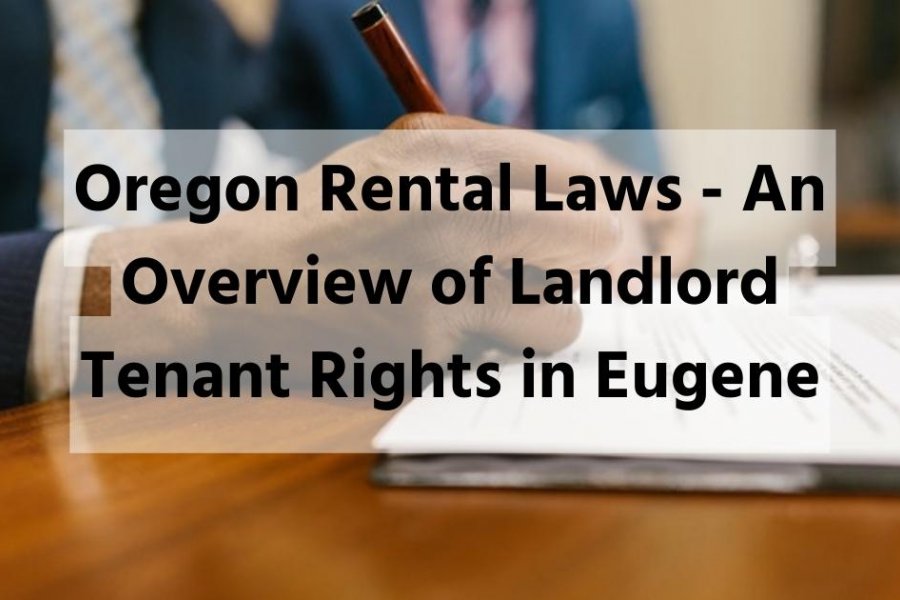
Key Takeaways
- Oregon property owners must provide multiple legal disclosures — These include details about lead-based paint, utility arrangements, flood zones, and carbon monoxide alarms, among others, and must be given before a tenant moves in.
- Both landlords and tenants have specific rights and obligations under Oregon law — Tenants are entitled to habitability, fair notice for rent increases and entry, and protection from discrimination, while landlords have the right to collect deposits, raise rent (with limits), and evict with proper legal process.
- Strict legal procedures govern rent control, evictions, and lease terminations — Oregon has statewide rent control, defined processes for eviction, and legally justified reasons Oregon tenants may break a lease early, such as military duty or uninhabitable conditions. Seek legal aid services for help navigating this system.
In the state of Oregon, a rental agreement is established after a residential landlord accepts a rent payment in exchange for allowing a tenant to inhabit their Oregon property under Oregon landlord-tenant law. And once this is done, both landlords and tenants in Oregon obtain certain rights and obligations under the Residential Oregon landlord-tenant law.
As a landlord in Oregon, it’s important that you familiarize yourself, as well as your tenant, with federal law and Oregon law for landlords and tenants. It is important you abide by Oregon law to avoid all aspects of federal housing discrimination and have all possible court papers. This can not only help you perform your residential landlord duties better, but can also help you avoid legal issues with your tenant.
Required Landlord Disclosures
According to Oregon landlord-tenant law, landlords must provide their tenants with certain legal information. The required disclosures are as follows.
- Disclosure on the use of lead-based paint. This is a federally required disclosure requiring landlords renting out homes built prior to 1978 to inform their Oregon tenants about lead paint.
- Disclosure on the contact information of the parties responsible for managing the rental.
- Disclosure on flood zones. Landlords must let prospective tenants know in the lease or rental agreement about whether their property lies in a floodplain.
- Disclosure on smoking policy. If the landlord has a smoking policy, they must let prospective tenants know about it before moving in.
- Disclosure on utilities. Landlords in Oregon must let prospective tenants know about how utilities are going to be shared.

- Disclosure regarding pending suits. If the Oregon property has four or fewer units and a known suit is pending, the landlord must let prospective tenants know about any outstanding notices regarding the suit.
- Disclosure on maintenance of a carbon monoxide alarm. Landlords must let prospective tenants know that they will be responsible for maintaining the carbon monoxide alarm on their rental unit.
- Disclosure on the manner in which the landlod will hold their deposit. This is only applicable to landlords in Portland. They must contact prospective tenants with the name and address of the financial institution that will hold their deposit.
Tenants’ Rights & Responsibilities in Oregon
Renters have the following legal rights under Oregon law. The legal right to:
- Live in a property that abides by Oregon's warranty of habitability.
- Withhold rent if the property is not habitable.
- Live in peace and quiet in accordance with the Implied Covenant of Quiet Enjoyment.
- If evicted, have their eviction enacted through a judicious and legal eviction process.
- Have their deposit returned no later than 31 days after moving out.
- Terminate their lease for certain legally justified reasons, such as when beginning active military duty.
- Be notified 30 days in advance prior to a rent increase or increase on fixed utility bills.
- Be treated without any form of discrimination on the basis of certain protected classes.
- Be notified 24 hours in advance prior to landlord entry.
- Be served the aforementioned disclosures like who has to pay utility bills prior to signing the lease and moving into the property.

Equally, a tenant in Oregon has their fair share of obligations as well. They have a responsibility under Oregon law to:
- Maintain all fixtures and ensure they are clean and sanitary.
- Keep their rented unit in a safe and habitable condition.
- Use all facilities and appliances for their intended purpose.
- Conduct waste disposal in a clean, safe, and legal manner.
- Take care of small repairs and maintenance.
- Change batteries in smoke detectors and carbon monoxide twice a year.
- Not to cause negligent or careless damage to the unit.
- Not to cause disturbance to other tenants or neighbors.
- Notify the Oregon landlord when looking to move out.
- Pay rent on time in accordance with the agreement and submit all unpaid rent before moving out
- Abide by all terms of the rental agreement to avoid eviction.
Landlords’ Rights & Responsibilities in Oregon
Oregon's landlord tenant laws maintain that landlords have the following legal rights. A right to:
- Enact eviction against an Oregon tenant for failing to comply with the provisions of the lease, including not paying rent in full or on time
- Draft a lease that’s in accordance with Oregon law.
- Require tenants to pay a security deposit prior to moving in.
- Raise rent by up to 7% annually, except for units that are less than fifteen years old.
- Enter their tenant’s unit to perform important landlord responsibilities.
The following are some requirements expected of all Oregon state landlords.
- Provide a home that meets all applicable safety, health and structural codes.
- Enact legal eviction against tenants by following the proper Oregon eviction process.
- Respond to maintenance requests within 7 days for essential services and 30 days for all other issues. If a landlord fails to do this, it can cause issues.

- Provide your tenant with the aforementioned disclosures in a written notice prior to allowing them to move in.
- Abide by the Oregon security deposit laws.
- Abide by all terms of the lease.
Overview of the Landlord-Tenant Law in Oregon
1. Landlord Entry
Landlords in Oregon have a responsibility by law to communicate with their tenants with a 24 hours’ advance notice prior to entering their rental property. In the notice, the landlord must also let their tenant know about the time and reason for the entry.
2. Housing Discrimination
Tenants in Oregon are protected against all forms of housing discrimination on the basis of certain protected classes. Classes protected under federal housing discrimination include race, color, nationality, religion, marital status, disability, income source, sexual orientation, and gender identity.
The state’s antidiscrimination law is administered by the Oregon Bureau of Labor and Industries Civil Rights Division.
3. Rent Control
Oregon is among the few states in the United States that has an official statewide rent control law in place for each landlord and tenant. It only applies to rental increases and does not apply to rent cost or security deposits.
4. Early Lease Termination
Tenants in the state of Oregon can break their lease early in certain legally justified scenarios. They include: active military duty, domestic violence, landlord harassment, or an uninhabitable unit.

In each case, Oregon tenants must meet certain requirements and produce a lease termination notice in order to move out without any further legal obligations in regards to rent payment. The legal notice period depends on the length of tenancy, such as whether they're month to month tenants, or if they rent on a fixed term.
Otherwise, landlords in Oregon may enact an eviction. They will need to acquire legal aid services to assist in taking their tenant to Oregon eviction court. Make sure to seek legal advice from a qualified professional before proceeding.
5. Security Deposits
Landlords in Oregon who require a security deposit have a responsibility to abide by Oregon law regarding security deposits and landlord tenant laws. Among other things, the rules specify things like:
- The maximum deposit a landlord can charge by Oregon law.
- When the landlord must return it.
- The legal deductions landlords can make from the security deposit.
- The penalties the landlord may be liable for if they wrongfully withhold the security deposit.
6. Tenant Evictions
Landlords have a right to enact eviction against their tenant for violating the terms of the agreement under Oregon landlord-tenant law. Common violations that are grounds for legal eviction in the state of Oregon include:
- Nonpayment of rent.
- Excessive property damage.
- Falsified information on the lease agreement.
- Failure to leave after the tenancy is over.
Landlords must follow the proper legal eviction procedure when evicting an Oregon tenant for any of these reasons. Consider seeking legal aid services from a professional specializing in landlord tenant law to avoid problems with the eviction. Getting professional legal services will make sure everything in the eviction process is done correctly and in accordance with Oregon and federal eviction laws.
Legal aid services for evictions include things like a court summons and dates, written notice of eviction, and dealing with organizations like the eviction defense project.
Bottom Line
If you have any questions or need additional information regarding any aspect of the federal landlord-tenant law or Oregon landlord-tenant law, Campus Connection Property Management can help. We are a comprehensive property management company serving landlords in Eugene, Oregon and the surrounding areas. Get in touch with us to learn more about how we can help you achieve stress-free property management!
Disclaimer: This information isn’t a substitute for professional specific legal help from a qualified attorney. Official laws change and this information may not be up to date at the time you read it so it is important to seek legal aid services from an attorney for professional, helpful legal advice.
